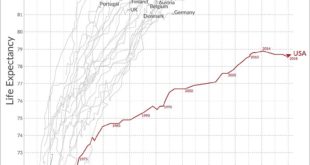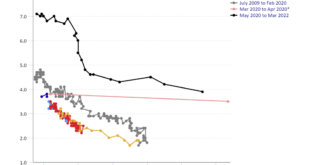Το Εργαστήριο Κοινωνικής Πολιτικής (Ε.Κοι.Π.) του Παντείου Πανεπιστημίου σε συνεργασία με το Κοινωνικό Πολύκεντρο της ΑΔΕΔΥ διοργανώνουν παρουσίαση της μελέτης με τίτλο: «Το Επίπεδο και η Εξέλιξη των Αμοιβών στον Ελληνικό Δημόσιο Τομέα από την Κρίση του 2009-10 μέχρι Σήμερα». Η μελέτη εκπονήθηκε από τους Στ.Μαυρουδέα (Καθηγητή Πολ. Οικονομίας, Τμ. Κοινων. Πολιτικής, Πάντειο Πανεπιστήμιο) και Κ.Πασσά (ερευνητή ΚΕΠΕ, διδάσκοντα του Τμ. Κοινων. Πολιτικής του Παντείου Πανεπιστημίου)....
Read More »Life expectancy vs. health expenditure
source
Read More »Open thread May 24, 2022
I approached election night with gloom but …
As the polls closed on Saturday night, most election commentary focused on the dispiriting campaign where both major parties avoided any substantial division on policy issues and instead focused on negatively framing the opposing leader. Even to many seasoned political minds, the most likely outcome seemed to be a reversal of the last parliament, with Labor winning enough seats to form a narrow majority, and one or two more seats falling to independents. As we all now know, the...
Read More »PEF AT THE CEA 2022
Once again , PEF will be at the Canadian Economics Association (CEA) annual conference!We now have the official schedule for the 2022 CEA meetings to be held at Carleton University, Ottawa. The conference will be on-line Tuesday, May 31 and in-person Friday, June 3 and Saturday, June 4.Please note that in addition to the sessions below, the PEF annual general meeting (AGM) is on Saturday June 4 from 2 pm to 3:30 pm.. PEF sessions are below. The full CEA program is available at:...
Read More »Great and rising inequality
from Jamie Morgan An interest in great inequality and rising inequality have become prominent features of our times. According to Oxfam in 2019 the 26 richest people on the planet had equivalent wealth to the 3.8 billion who comprise the lower 50% of the world population. The previous year it required the top 43 to create this equivalence. The 2020 Oxfam report adds a series of statistical claims: the world’s richest 1% have more than twice the wealth of 6.9 billion of the world’s...
Read More »Ethical criteria which hold the sustainability of life at their core
from Fernando García-Quero and Fernando López Castellano Overconfidence in the magical thinking of technification, economic growth, the free market, and neoliberal globalization has led many to forget that the state is the main policy architect and actor when facing a crisis. Successful responses to Covid-19 have shown, once again, the central role of states in organizing political measures that foster and maintain the welfare of their populations, through actions to guarantee quarantine,...
Read More »The Collapse of the India’s creative Industries
from Jayati Ghosh There is no doubt that creative industries, along with care activities, are going to emerge as some of the most significant economic sectors of the future. Broadly speaking, the creative industries consist of advertising, architecture, arts and crafts, design, fashion, film, video, photography, music, performing arts, publishing, research & development, software, computer games, electronic publishing, and TV/radio. A 2019 report from by UNCTAD (Creative Economy...
Read More »Russia and the end of nuclear power
Of the 50-odd nuclear plants currently under construction, around 1 in 3 are Russian VVER designs, being built by Rosatom. Sanctions on the supply of all kinds of electronics mean that few of these will be completed on time, if ever. in promoting sales, Russia has relied heavily on concessional financing through Sberbank, which is also sanctioned. That’s going to make future sales just about impossible, and create big difficulties in fulfilling existing commitments. With the...
Read More »Beveridge Curves – Covid edition
Beveridge curves are graphical representations of the historical relationship between unemployment and the job openings/job vacancy rate. They should be called ‘Beveridge Ellipsoids‘ as they are banana shaped (an ellipsoid with one bent axis, aside of banana-shaped there does not seem to be an official name for such an ellipsoid). Just calling it a ‘curve’ is somewhat misleading as the banana-shape is no coincidence but caused by labor market dynamics: high unemployment leads to an...
Read More » Heterodox
Heterodox





